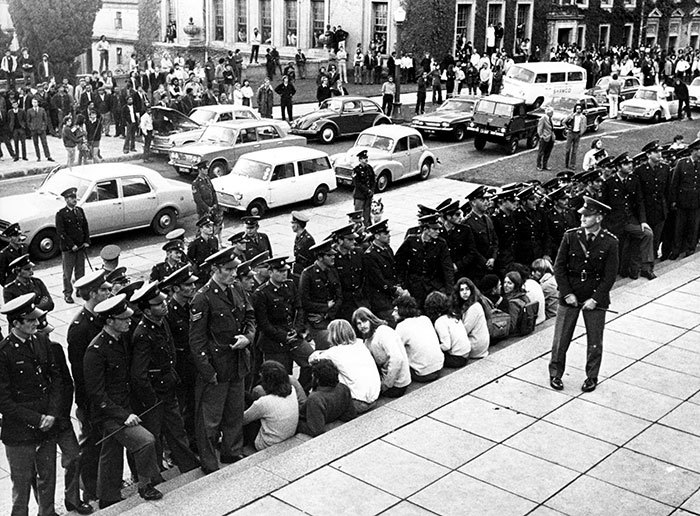Breaking the academic boycott
20 April 2015 | Story by Newsroom
When Conor Cruise O'Brien – an Irish academic and politician – broke the academic boycott in 1986 to deliver a lecture series at UCT, students organised a vocal campaign against his presence, including protests and disruptions of his lectures.
"Towards the end of September 1986, Conor Cruise O'Brien, the Irish academic and politician, gave a series of lectures on the campus and soon presented the university with a major crisis. A number of articles had appeared in the media in which O'Brien had been very critical of the academic boycott. He addressed a lunch-time meeting of students in the course of which he described the academic boycott as 'mickey mouse'. A group of students, particularly some of the members of the Azanian Students Organisation (AZASO), were furious and vigorously objected to his being allowed to continue to speak on campus. The students threatened to disrupt a lecture to be given on the same evening under the auspices of the Kaplan Centre for Jewish Studies, where O'Brien was to speak on the Middle East ...
"I strongly criticised what happened, but it was clear to me that they would not allow O'Brien to speak on the campus again. I phoned O'Brien in Johannesburg and explained the position to him saying that I couldn't guarantee his protection on the campus and did not think he would be able to speak and that if he tried to do so, violence was likely to result. (I was unable to call the police because of previous actions by them on campus, and their total unpredictability once they were there. They were correctly seen as the agents of the apartheid state. I had to rely entirely on our small, unarmed, campus control personnel.) ... This event split the university. There were those who argued along the same lines as the students had done. On the other hand, there were those that felt very strongly that freedom of speech was a fundamental part of the university, and that if it couldn't be ensured, the very existence of the university as an institution of higher learning was threatened." Stuart Saunders
"I remember when Conor Cruise O'Brien, an Irish academic, broke the boycott and came to South Africa for a lecture tour. The initial objective of our protest action was to get the university to cancel his invitation, and thus have it support the campaign to isolate South Africa. When it became clear that this was not going to happen, we changed tack and started protesting at his lectures, effectively disrupting them so that eventually he had to abandon his lecture tour." Saleem Mowzer
"The students – it was mainly those from the left wing – ran a very vocal, militant campaign against his presence on campus, because he was breaking the academic boycott by coming to South Africa. We protested outside the lecture hall where he was speaking. Pamphlets were handed out. The SRC passed a resolution condemning his presence on campus. Wherever he went there was heckling and disruption. Eventually his tour was cancelled." Mike Evans
Return to A people's history of struggle main story
 This work is licensed under a Creative Commons Attribution-NoDerivatives 4.0 International License.
This work is licensed under a Creative Commons Attribution-NoDerivatives 4.0 International License.
Please view the republishing articles page for more information.










